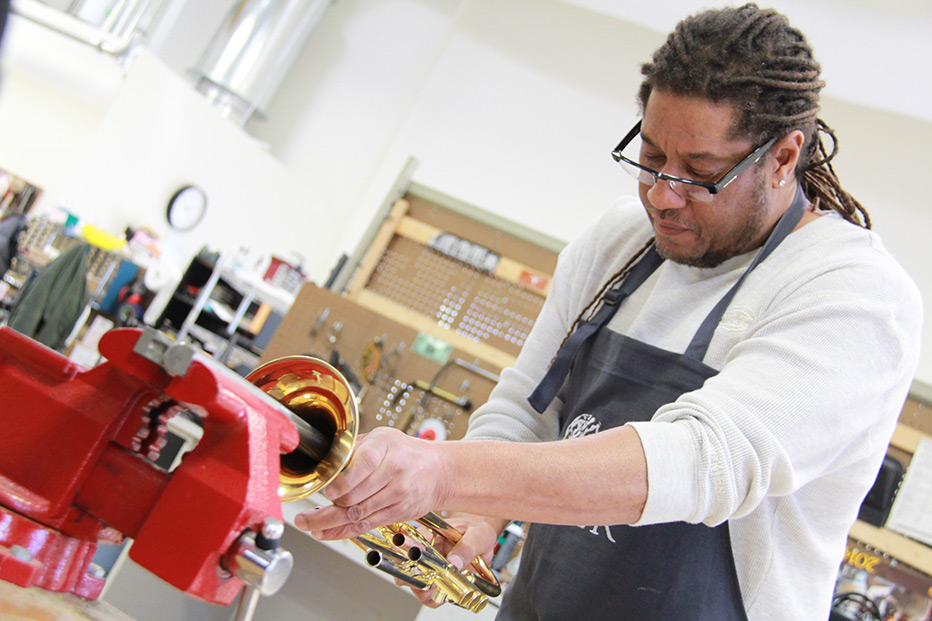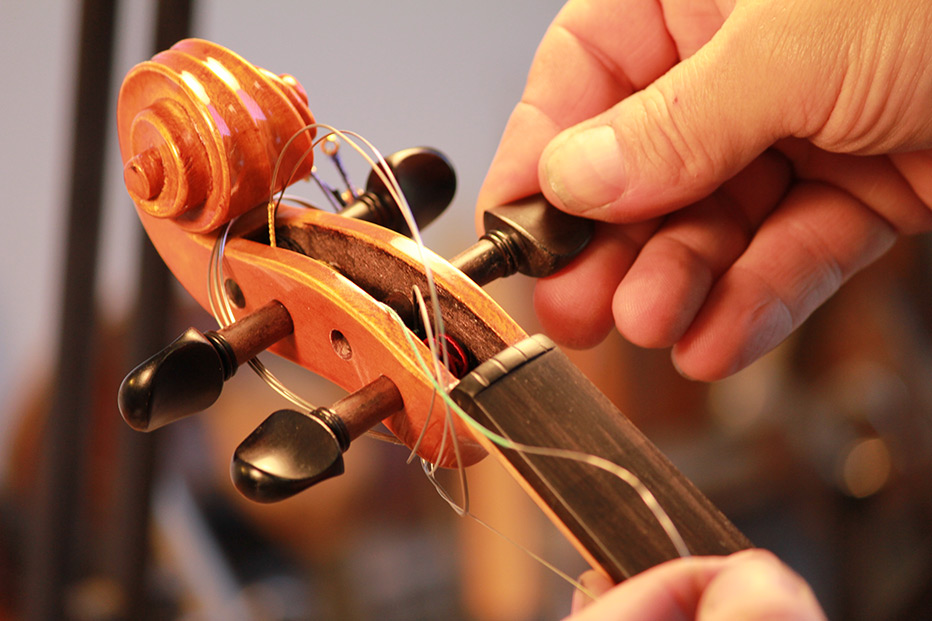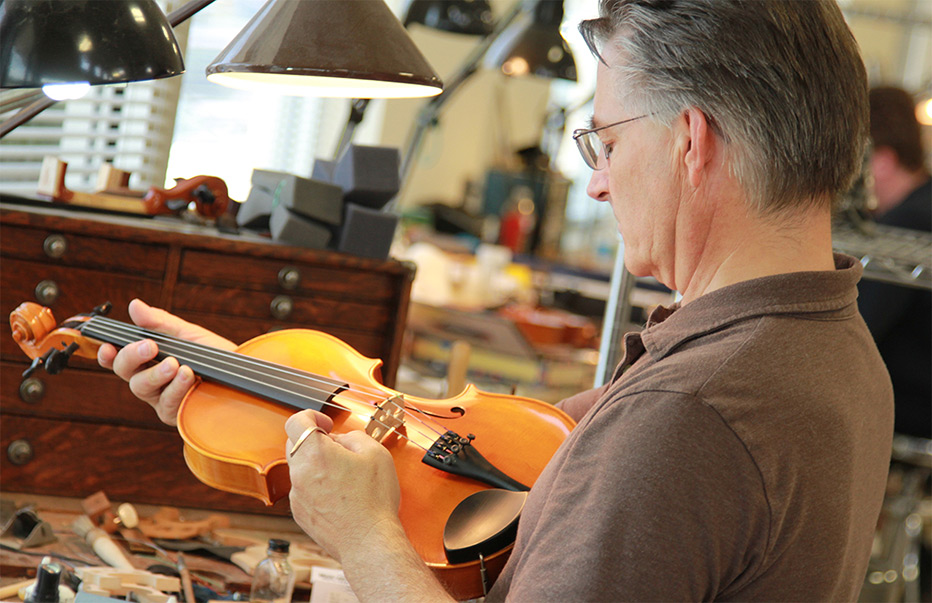April 09, 2015
Guitar Maintenance: Tips and Advice


So, you’ve taken the plunge and purchased a guitar. Whether it’s brand new or just new to you, the proper care and maintenance of your guitar is essential for its longevity and quality of performance. You’ll want to do everything you possibly can to keep it in tip-top shape; if you do, you’ll be able to enjoy your guitar and make music for years to come. Maintaining a guitar includes cleaning it frequently, storing it properly, changing its strings, and knowing when to take it into a professional repair shop for repairs or adjustments. If you’re new to playing the guitar, here are essential maintenance tips to keep in mind.
Keep it Clean
Whether you have an acoustic or electric guitar, a soft cloth is your best choice for wiping down and cleaning your guitar. Many manufacturers sell special cleaning cloths and packages made especially for the guitar, but an old 100% cotton t-shirt will do the trick. When cleaning your guitar, stay away from paper towels, as these can actually scratch and damage your guitar. When cleaning your guitar, pay special attention to the strings.The dirt and oil left on the strings after use will oxidize over time and kill your tone. Not only does string oxidation cause strings to sound dead, but it can also lead to premature breakage. As a part of your maintenance routine, wash your hands before you pick up your guitar, and wipe down the strings and fretboard after each use.


Humidity & Temperature
Most guitars are made of thin pieces of solid wood that are glued together. As a result, they are directly affected by changes in humidity and temperature. For example, a guitar that absorbs too much moisture will swell in shape. This expansion distorts the geometry of the guitar and, as a result, its playability and sound. With prolonged exposure, the glue will gradually dissolve and, in some cases, can cause the bridge to fall off. Overly dry environments can also have damaging effects on your guitar. While you can’t control the weather, you can control the conditions your guitar is stored and played in. Keep your guitar in a case when not in use and, if you live in an especially dry area, purchase a humidifier for your case. Never store your guitar in cold, damp areas and never transport your guitar in the trunk of a car.


Tuning Machine Maintenance
Typically, tuning machines require very little maintenance other than periodic lubrication. With that in mind, loose tuning machines can contribute to tuning problems. If your guitar has trouble staying in tune, the tuning machine may require some attention. Enclosed machines are lubricated by the manufacturer and won’t require any maintenance but, if your guitar has an open tuning machine, you’ll need to lubricate it once or twice a year. To do so, place a small dab or petroleum jelly on the end of a toothpick and apply the jelly to the gears. When applying petroleum jelly to the gears, be careful not to use too much because it can collect dust and dirt and wear out the machine over time.
Purchase a Sturdy Case
The best guitar maintenance is preventative, and the best preventative measure you can take is investing in a sturdy guitar case. The safest place for your guitar, besides in your hands, is in a case that has been properly fitted for your guitar. Many guitars already come with a case or gig bag, but it’s never a bad idea to upgrade your case for the ultimate in protection. When purchasing a case for your guitar, make sure the neck of your guitar is fully supported. Since this is the most fragile part of your guitar, it’s important that the neck is held snugly in place during transport and storage. Also keep an eye out for sturdy latches. For more advice on purchasing a sturdy guitar case, check out Guitar Cases: A Complete Guide.


Warranties & Insurance
Although many new guitars come with a manufacturer’s warranty, these are quite limited in nature and typically only cover manufacturer’s defects for a short amount of time. Unfortunately, they won’t cover routine maintenance procedures or damage that’s the result of user error. To protect yourself later on, ask for a copy of the warranty and read it thoroughly. Make sure you understand which problems are covered under the “normal wear” portion of the warranty and, if you aren’t sure, ask the technician when you bring it in for maintenance. For extra protection, consider taking an insurance policy out on the guitar- especially if your child plans on traveling with the instrument or removing it from the safety of your home on a frequent basis.
Guitar Care While Traveling
Since the guitar travels more than any other instrument in the world, it’s only a matter of time before you take your guitar on its first trip. If you’re traveling by car, don’t make your guitar travel in the trunk. If possible, make space for your guitar in the back seat of your car- here, it’ll be protected from fluctuations in temperature and humidity, and it won’t be as prone to damage from movement. If you’re traveling by air, try to carry the guitar on the plane with you whenever possible. If it exceeds the size restrictions and needs to be checked, loosening the strings and using a soft cotton packing material in the case will keep the guitar snugly in its case and will decrease the possibility of damage while your guitar is in the baggage compartment. And, as always, only travel with your guitar in a hard, durable case.
Visit a Professional
In order to keep your guitar in perfect shape, visits to a professional technician are a must. Any new guitar should be professionally set up before use and checked out at least every six months. Since most guitars are manufactured out of wood, seasonal climate changes may require routine adjustments. Also, normal wear and tear (such as fret wear) can be addressed before they become a more serious problem. Although you can fix many guitar issues on your own, there are quite a few problems that should only be addressed by a professional. These include cracks in the finish, grounding problems, and issues with your guitar’s wiring. If you believe your guitar has any of these issues, contact your local repair professional as soon as possible.
Need advice on changing guitar strings? Check out How to Change Electric Guitar Strings.







